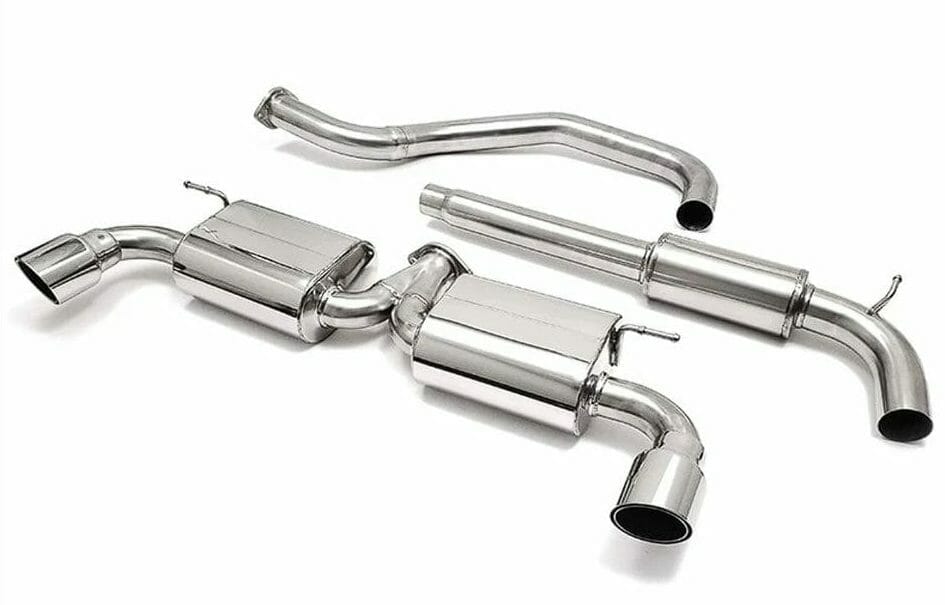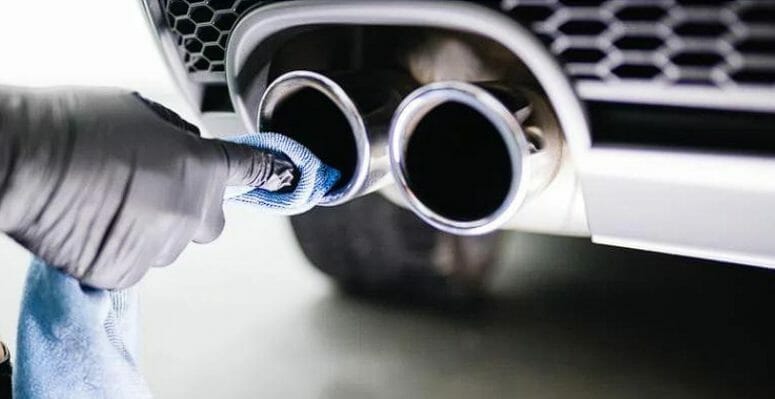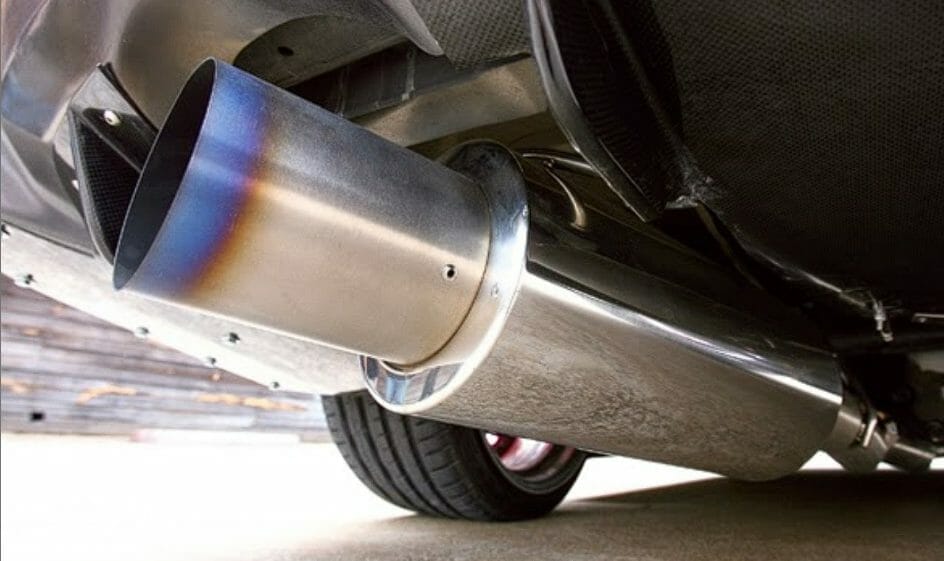If you’re in the market for a new exhaust system, you may be wondering which material is the best choice for your vehicle. In this article, we’ll compare aluminized and stainless steel exhaust systems, highlighting the pros and cons of each option to help you make an informed decision.
Key Takeaways
- Aluminized exhausts are more cost-effective and durable for budget-friendly vehicles.
- Stainless steel exhausts offer superior corrosion resistance, heat protection, and longevity, making them ideal for high-performance vehicles.
- Both aluminized and stainless steel exhausts have their advantages and drawbacks.
- Consider your budget, driving needs, and desired level of performance before making a decision.
- Consult with a trusted automotive professional or exhaust specialist to find the perfect fit for your vehicle.
What is Aluminized Exhaust?
Aluminized exhaust systems are a popular option for many vehicles due to their cost-effectiveness and durability. They are made by coating steel pipes with a layer of aluminum-silicon alloy, which provides excellent corrosion resistance and heat protection.
Compared to stainless steel exhausts, aluminized exhausts are more affordable and commonly used in factory-installed systems or budget-friendly vehicles. However, aluminized exhausts may not provide the same level of resilience as stainless steel and could eventually show signs of rust over time.
Aluminized exhausts are a reliable choice for vehicles with average usage.
If you’re considering an aluminized exhaust, it’s important to regularly inspect your system for signs of corrosion and apply touch-up paint as needed to prevent rust. Overall, aluminized exhausts offer good value and protection for your vehicle’s exhaust system.
What is Stainless Steel Exhaust?
Stainless steel exhaust systems are crafted entirely from stainless steel. Stainless steel is a metal alloy that offers high resistance to corrosion, rust, and heat. This durability and resistance to harsh elements make it an excellent option for high-performance and luxury vehicles. Due to its high cost, stainless steel exhaust systems are usually found on premium cars and custom-built vehicles.
Stainless steel exhausts offer superior performance and longevity compared to aluminized exhausts. Their high-quality construction ensures that they can withstand the rigors of high-performance driving and remain intact after impacts from road debris. Stainless steel exhaust systems also come with the added benefit of requiring less maintenance over time than aluminized exhausts.
Corrosion Resistance

One of the most significant differences between aluminized and stainless steel exhaust systems is their corrosion resistance. While aluminized exhausts are reasonably resistant to rust and corrosion, stainless steel exhausts outperform them in this regard. Stainless steel has inherent resistance to rust and corrosion, making it ideal for vehicles exposed to harsh weather conditions and road salt.
On the other hand, aluminized exhausts may eventually show signs of rust over time. If you live in a region with high humidity or regularly drive on salt-treated roads, you may want to consider a stainless steel exhaust for its superior corrosion resistance.
Heat Protection
Both aluminized and stainless steel exhausts offer reliable heat protection for your vehicle. Aluminized exhausts feature a layer of aluminum-silicon alloy coating that acts as a thermal barrier, preventing excessive heat transfer. This makes aluminized exhausts suitable for stock and budget-friendly vehicles as they can withstand the average usage. On the other hand, stainless steel, with its high melting point, can withstand extreme temperatures without compromising its structural integrity. Therefore, it’s an ideal choice for high-performance and luxury vehicles that demand enhanced heat resistance.
While both aluminized and stainless steel exhausts offer good heat protection, stainless steel outperforms in terms of heat resistance due to its alloy composition. So if you’re driving under extreme conditions, it’s best to invest in a stainless steel exhaust for optimal protection.
Durability
When it comes to durability, stainless steel exhaust systems are the clear winner. They are known for their ability to withstand extreme driving conditions and resist damage from road debris and impacts. On the other hand, while aluminized exhausts are certainly durable, they may not provide the same level of resilience as stainless steel and could be more prone to corrosion over time.
If you’re looking for an exhaust system that can handle high-performance driving and long-term use, stainless steel is the way to go. However, if you don’t require the same level of durability and drive a vehicle with less demanding conditions, an aluminized exhaust can still be a cost-effective and reliable option.
Maintenance and Cleaning

Keeping your exhaust system clean and well-maintained is essential for its longevity and optimal performance. Stainless steel exhausts are relatively easy to maintain and clean, requiring only occasional attention. Stainless steel exhaust cleaner is readily available and a great option to remove dirt, grime, and discoloration from your exhaust.
Aluminized exhausts may require a bit more frequent care to prevent corrosion and rust. It’s essential to inspect your exhaust system regularly for any signs of corrosion or damage and clean it accordingly. Applying touch-up paint to any affected areas can help avoid further rust development.
Sound and Performance
When it comes to choosing between aluminized and stainless steel exhaust systems, sound and performance are critical factors for many car enthusiasts. While the material used in the exhaust’s construction has only a minimal impact on the overall sound and performance of the vehicle, the design of the mufflers and the exhaust system layout are critical.
With that said, stainless steel exhaust systems are often preferred by high-performance drivers due to their ability to handle the rigors of high-speed driving and extensive modifications. Stainless steel is known for its durability and corrosion resistance, which can help enhance the performance and longevity of the exhaust system.
On the other hand, aluminized exhaust systems are a popular choice for budget-conscious drivers and those looking for a reliable, stock exhaust system. While they may not offer the same level of performance as stainless steel, aluminized exhausts can still deliver an excellent driving experience for average usage vehicles.
Overall, whether you choose aluminized or stainless steel exhaust systems, sound and performance will largely depend on the vehicle and driving conditions. Consider consulting with an exhaust specialist or automotive professional to determine which option will best suit your needs.
Cost
One of the biggest factors to consider when choosing between aluminized and stainless steel exhaust systems is the cost. Aluminized exhausts are generally more affordable upfront, making them an appealing option for budget-conscious vehicle owners.
However, it’s essential to keep in mind that while aluminized exhausts may provide cost-effectiveness, they may require more maintenance and replacement over time due to their susceptibility to corrosion. On the other hand, while stainless steel exhausts may be more expensive upfront, they offer better long-term value due to their durability and corrosion resistance.
Ultimately, the choice between aluminized and stainless steel exhaust systems depends on your budget, driving needs, and personal preferences. If you drive a vehicle that doesn’t require high-performance exhaust, aluminized exhaust can be a suitable option. However, if you prioritize longevity, corrosion resistance, and enhanced performance, then stainless steel is the way to go.
Which One Should You Choose?
After evaluating the pros and cons of aluminized and stainless steel exhaust systems, the decision ultimately comes down to your individual needs. If you’re working within a tight budget or don’t require high-performance exhaust, aluminized exhausts can be a suitable and cost-effective option. However, if you prioritize longevity, corrosion resistance, and better performance, you may want to consider investing in a stainless steel exhaust system.
Stainless steel is ideal for those who drive in harsh conditions exposed to road salt and moisture. It is also a good choice for high-performance and luxury vehicles, where durability and high-quality performance are necessary. Although they can be more expensive upfront, stainless steel exhaust systems offer better value in the long run due to their durability, resistance to corrosion, and overall performance.
On the other hand, aluminized exhausts are still a reliable choice for vehicles with average usage. They are cost-effective and durable, making them a popular choice for stock and budget-friendly vehicles.
Ultimately, the choice between aluminized and stainless steel exhaust systems comes down to your budget, driving conditions, and personal preferences. Consult with a trusted automotive professional or exhaust specialist to find the perfect fit for your vehicle and driving needs.
Which One Should You Choose?
Ultimately, the choice between aluminized and stainless steel exhaust systems comes down to your individual needs and preferences. If you’re working with a limited budget or driving a vehicle that doesn’t require high-performance exhaust, aluminized may be a suitable option. On the other hand, if you prioritize longevity, corrosion resistance, and enhanced performance, stainless steel is the way to go.
Remember, both aluminized and stainless steel exhaust systems have their advantages and drawbacks. While stainless steel exhausts offer superior corrosion resistance, heat protection, and durability, aluminized exhausts still provide reliable performance for vehicles with average usage.
When making your decision, consider your budget, driving needs, and desired level of performance. Consult with a trusted automotive professional or exhaust specialist to find the perfect fit for your vehicle. With the right exhaust system installed, you can enhance your driving experience and enjoy the benefits of improved performance and longevity.
Get the Perfect Exhaust for Your Vehicle Today

Choosing the right exhaust system for your vehicle can enhance its performance and longevity. Whether you’re looking for a budget-friendly option or a high-performance upgrade, aluminized and stainless steel exhaust systems offer unique benefits for your vehicle.
Aluminized exhausts are a cost-effective solution that provides good corrosion resistance and heat protection. They are commonly used in stock and budget-friendly vehicles due to their affordability and durability.
Stainless steel exhaust systems, on the other hand, offer superior corrosion resistance, heat protection, and durability. They are ideal for high-performance and luxury vehicles, as well as those exposed to harsh weather conditions and road salt.
Ultimately, the choice between aluminized and stainless steel exhaust systems depends on your budget, driving conditions, and personal preferences. While aluminized exhausts offer good value for budget-conscious enthusiasts, stainless steel exhausts offer better long-term value due to their durability and corrosion resistance.
The Benefits of a Quality Exhaust System
A quality exhaust system not only enhances the performance and longevity of your vehicle but also provides several other benefits, including:
- Improved fuel efficiency
- Enhanced engine sound
- Better exhaust flow
- Reduced emissions
By investing in a quality exhaust system, you can elevate your driving experience and enjoy the benefits of improved performance and efficiency.
Consult with an Expert
To find the perfect exhaust system for your vehicle, it’s essential to consult with a trusted automotive professional or exhaust specialist. They can help you identify your driving needs and recommend the best exhaust system for your vehicle.
So, whether you’re looking for a budget-friendly option or a high-performance upgrade, consult with an expert and get the perfect exhaust system for your vehicle today.
Remember, the key to a reliable and long-lasting exhaust system is proper installation and maintenance. Regular inspections and cleaning can help prevent corrosion and damage, ensuring your exhaust system performs at its best for years to come.
Read More : Master the Art of Welding Stainless Steel Exhaust Today!
What are the Differences Between 305 Stainless Steel and 316 Stainless Steel?
305 stainless steel and 316 stainless steel have notable differences. While both are stainless steels, the key discrepancy lies in their composition and performance. 316 stainless steel contains molybdenum, making it more resistant to corrosion than the 305 variant. Moreover, 316 stainless steel is better-suited for marine environments and offers higher heat resistance. In contrast, 305 stainless steel is a viable option for less demanding applications that don’t require the same level of corrosion resistance as 316 stainless steel. Differences between 305 and 316 stainless steel are crucial to consider when selecting the appropriate material for various purposes.
FAQ
Q: What is the difference between aluminized and stainless steel exhaust systems?
A: Aluminized exhaust systems are made by coating steel pipes with a layer of aluminum-silicon alloy, while stainless steel exhaust systems are made entirely of stainless steel.
Q: Which exhaust system is more corrosion resistant?
A: Stainless steel exhaust systems outperform aluminized exhaust systems in terms of corrosion resistance.
Q: Do aluminized exhaust systems provide good heat protection?
A: Yes, aluminized exhaust systems offer good heat protection with the aluminum-silicon coating acting as a thermal barrier.
Q: Are stainless steel exhaust systems durable?
A: Yes, stainless steel exhaust systems are known for their durability and ability to withstand high-performance driving.
Q: How do I maintain and clean a stainless steel exhaust system?
A: Stainless steel exhaust systems can be easily maintained and cleaned using specialized stainless steel exhaust cleaners.
Q: Do aluminized exhaust systems affect the sound and performance of a vehicle?
A: The material used in the construction of the exhaust system has minimal impact on the overall sound and performance.
Q: Is there a significant price difference between aluminized and stainless steel exhaust systems?
A: Aluminized exhaust systems are generally more affordable compared to stainless steel exhaust systems.
Q: Which exhaust system should I choose?
A: The choice between aluminized and stainless steel exhaust systems depends on your budget, driving conditions, and personal preferences.
Q: What are the advantages of stainless steel exhaust systems?
A: Stainless steel exhaust systems offer superior corrosion resistance, heat protection, and durability.
Q: Are aluminized exhaust systems suitable for average usage?
A: Yes, aluminized exhaust systems are a reliable choice for vehicles with average usage.
Q: What should I consider before making a decision on which exhaust system to choose?
A: Consider your budget, driving needs, and desired level of performance before making a decision on aluminized or stainless steel exhaust systems.
Q: Do both aluminized and stainless steel exhaust systems enhance the driving experience?
A: Yes, both aluminized and stainless steel exhaust systems can enhance the driving experience with improved performance and longevity.






